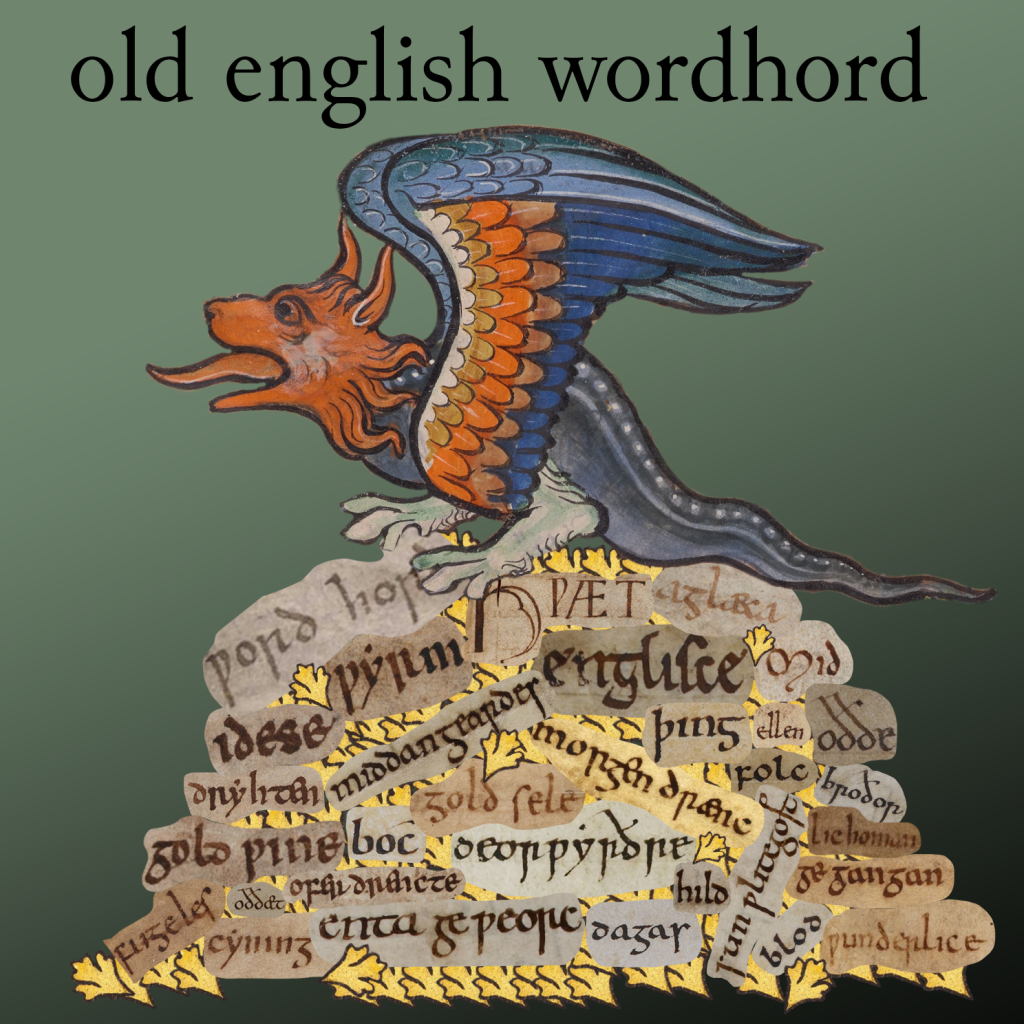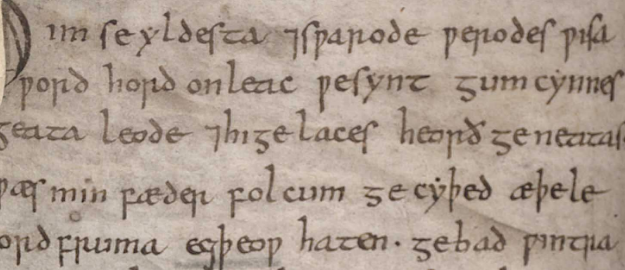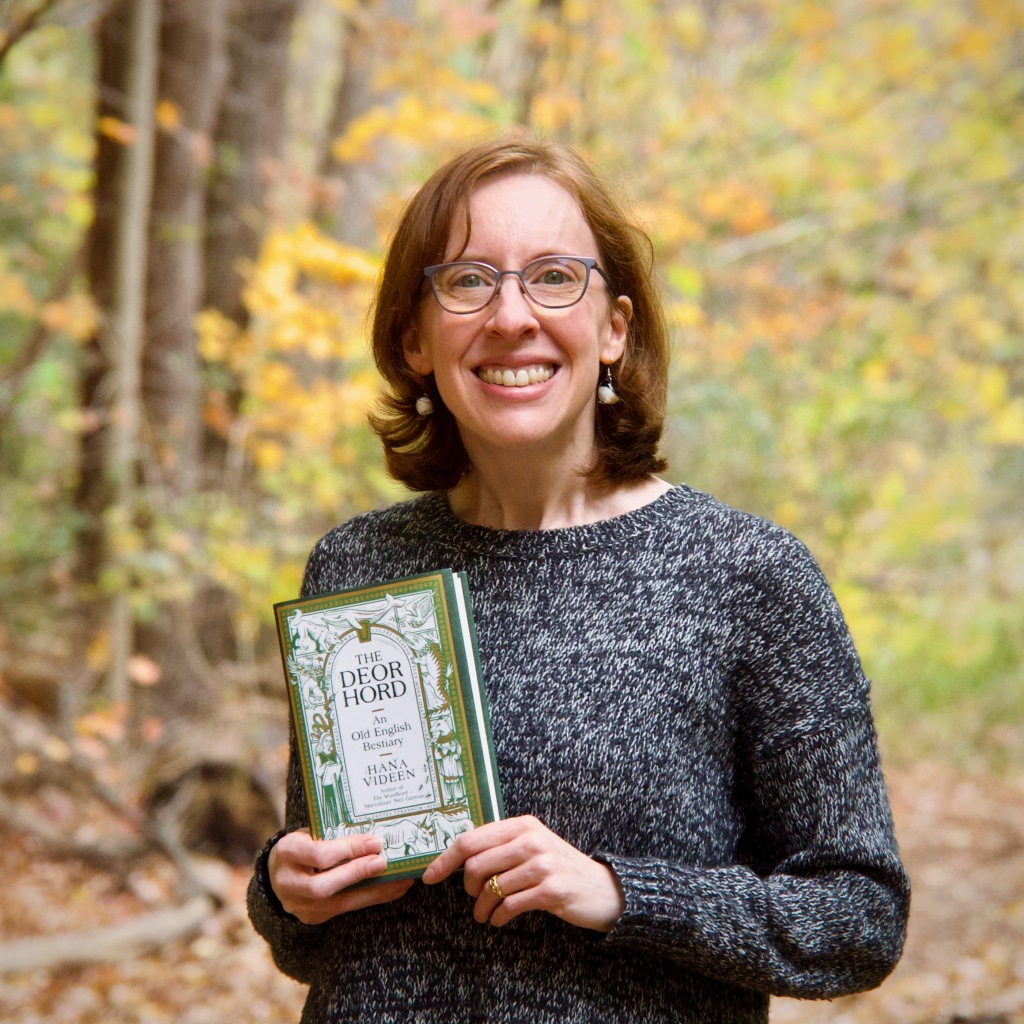
On 13 November 2013 I tweeted wordhord, the first Old English Word of the Day, on @OEWordhord. I haven’t missed a day since. (Those of you who are mathematically inclined can calculate how many words that is!) After a while I decided to make an Old English Wordhord blog, and eventually I added the Wordhord to Facebook and Instagram. The Wordhord is also on Patreon. (See Wordhord Wednesday page for exclusive, patron-supported content and posts.)
Old English was the vernacular language of England from roughly 550 to 1150, what is known as the early medieval period. This English quite different from the English we know today. To modern English speakers, Old English’s words are both strange (like neorxnawang, paradise) and familiar (word, word). Some words belong so completely to another time and place that they can’t really be translated into modern English (gafol-fisc, for instance, which literally means “tax-fish”).
The Old English word wordhord (word-hoard) describes the collection of words and phrases that a poet may draw upon while crafting tales. Unlike a dictionary or other physical book, this stockpile of verses and vocabulary exists only in the poet’s mind. Faced with the daunting task of reciting hundreds of lines of poetry, a storyteller would have certainly benefited from a well-stocked “hoard” of words.

The word wordhord appears seven times in Old English literature (only in poetry) and is most commonly found alongside the verb onleac (unlocked).
St Andrew unlocks his wordhord…
“Ða him Andreas ðurh ondsware, / wis on gewitte, wordhord onleac…”
“Then Andreas by way of answering, wise in understanding, unlocked his word-hoard…”
Andreas, lines 315-316
…as does Christ disguised as a seafarer…
“Ða gen weges weard wordhord onleac, / beorn ofer bolcan, beald reordade…”
“Again the Guardian of the way unlocked his word-hoard, the man over the gangway, spoke boldly…”
Andreas, lines 601-602
…as does the well-travelled poet Widsith.
“Widsið maðolade, wordhord onleac…”
“Widsith spoke, unlocked his word-hoard…”
Widsith, line 1
The warrior Beowulf unlocks his word-hoard when communicating with Hrothgar’s watchman…
“Him se yldesta ondswarode / werodes wisa, wordhord onleac…”
“The most senior answered him, the leader of the band, unlocked his word-hoard…”
Beowulf, lines 258-259
…as does Wisdom personified.
“Ða se wisdom eft wordhord onleac, / sang soðcwidas, and þus selfa cwæð…”
“Then Wisdom unlocked her word-hoard again, sang her own truths and spoke thus…”
Metres of Boethius, metre 6, lines 1-2
As with any hoard, the contents of a wordhord are valuable, if not to everyone at least to the person doing the hoarding. Its treasures may be shared with others whenever the hoard is “unlocked”.
Every day I unlock this Old English Wordhord to share a word with you. This is the Old English Word of the Day.
About the hoarder of words
Dr Hana Videen has been hoarding Old English words since 2013, when she began tweeting one a day. Now, thousands follow her for these daily gems. Having received her Old English doctorate at King’s College London, she is now a writer and blogger in Canada, translating curiosities of history into engaging narratives. Her first book The Wordhord: Daily Life in Old English was published by Profile Books (2021) and Princeton UP (2022). Her second book, The Deorhord: An Old English Bestiary was published by Profile Books (2023) and Princeton UP (2024).

See also:
Why I hoard words (a short piece I did for Princeton University Press’s Ideas blog)
On YouTube: my York Festival of Ideas 2022 presentation (1 hour)
In Old English, Blood Was at a Premium (essay for New Lines Magazine)
Hana Videen: “It’s a pretty silly idea that there’s a pure English” (an interview for the New Statesman, behind a paywall but you can read it if you register for 3 free articles a month)
Beyond bestiaries: the cats and dogs of Old English (a short piece I did for Princeton University Press’s Ideas blog)
Deorhord Q&A for Foreword Reviews
In The Deorhord, Old English scholar Hana Videen gives a lively account of fantastical beasts (an interview for The Globe and Mail)

Pingback: ‘Feoh’: Old English Cows, Wealth and Etymology – Coffeehouse Reflections